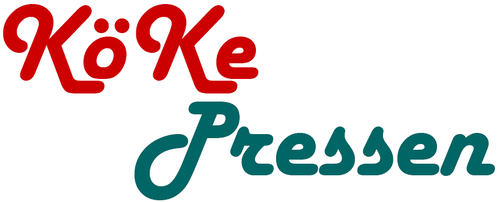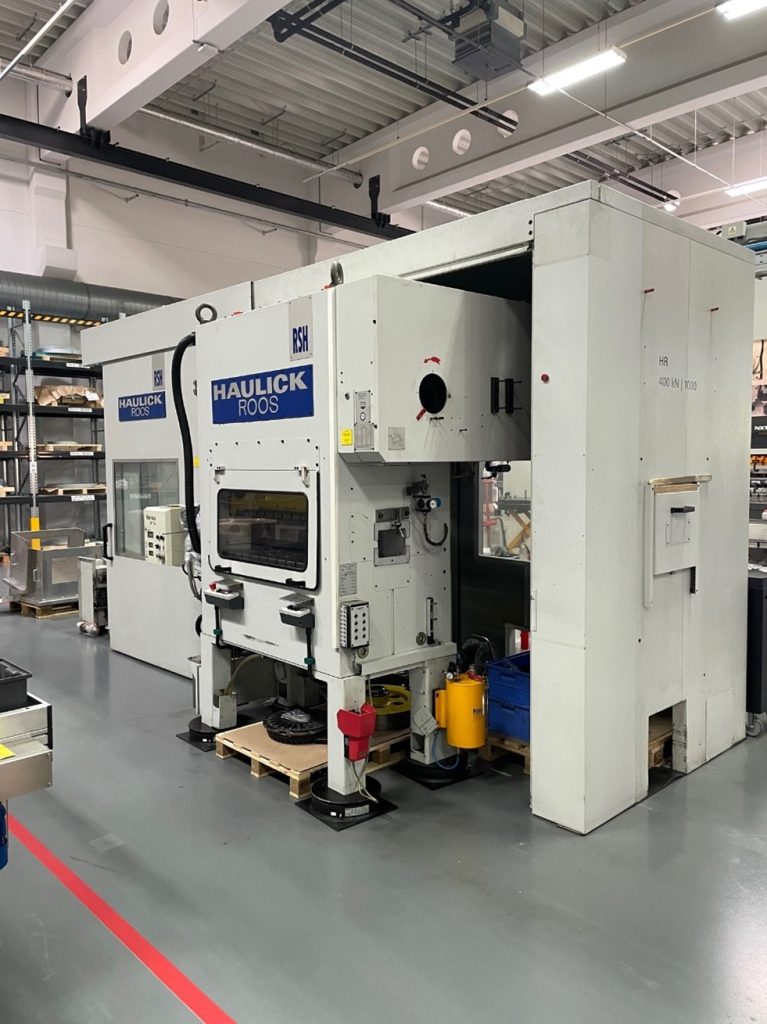General sales terms and delivery conditions
of the firm KöKe Pressen Maschinenhandel & Service Carsten Köhler e.K.,
Neuenhöhe 31, 42929 Wermelskirchen
§ 1
Scope – In general
1. The following sales terms and delivery conditions apply for all present and future business relationships.
2. The following sales terms and delivery conditions exclusively apply; conditions of the customer opposed to, differing from or supplementary to the following sales terms and delivery conditions, even on knowledge, do not become an integral part of the contract unless their validity is expressly consented to in writing. The following sales terms and delivery conditions also apply if the delivery to the customer is carried out without reservation in knowledge of opposed or differing sales terms and delivery conditions of the customer.
3. All agreements that are met for the purpose of the execution of this contract are stipulated in writing in this contract.
4. The following sales terms and delivery conditions only apply towards entrepreneurs. Entrepreneurs in terms of these business conditions are natural persons, legal persons or business partnerships with legal capacity, who on conclusion of the legal transaction, act in exercise of their industrial occupational activity or their independent occupational activity.
§ 2
Quotation – bidding documents – conclusion of contract
1. Is the customer’s order to be qualified as a quotation in terms of § 145 of the German Civil Code, we can accept this within two weeks. Our quotations are without obligation and subject to confirmation in so far as nothing else goes forth from the order confirmation. Prior sale remains reserved.
2. The information contained in our printed matters, quotations and other documents, such as details relating to measurements, weight and space, images, attributes, classifications, years of construction and specifications have been made to the best knowledge and are noncommittal.
3. The delivery only comprises those items, which are expressly stated in our order confirmation. We reserve the rights to ownership and copyright to images, drawings, calculations and other documents. This also applies for such written documents, which are described as “confidential”. The customer requires our explicit written consent before passing them on to third persons.
4. With the order of the goods the customer bindingly declares his will to acquire the ordered goods. We only regard the customer’s order as accepted once it has been confirmed by us. Telegraphic or verbal alterations, sub-agreements or such made by telephone require the written form.
5. Should the customer order the goods via the electronic method, we will immediately confirm the entry of the order. The confirmation of entry still does not present a binding acceptance of the order. The latter solely takes place via our written order confirmation.
6. The conclusion of the contract takes place with reservation of the correct and timely self-supply via our suppliers. This applies for the event of our not being liable to answer for the non-delivery, particularly on conclusion of an implied hedging transaction with our supplier. The customer is immediately informed about the unavailability of the service. The return service is immediately replaced.
§ 3
Prices – Terms of payment
1. The prices “ex works” apply in so far as nothing else goes forth from the order confirmation. Costs for freight, duty, postage, packaging, insurance and other charges are not contained in the price: these are invoiced separately.
2. The legal value added tax is also not included in the prices; it is separately accounted for on the invoice in its legal amount on the day on which the invoice is issued.
3. The deduction of cash discount requires a special written agreement. The acceptance of cheques or bills of exchange only takes place for reasons of payment: the customer carries the expenses for the discounting and for the collection.
4. The net purchase price (without deduction) is due for payment within 10 days from the date of invoice in so far as nothing else goes forth from the order confirmation. The customer comes into default of payment following the expiry of this time limit. During the period of delayed payment the customer must pay interest on the debt at a rate of 8% above the respective discount rate of the Deutsche Bank per annum. We reserve the right against the customer, to prove and assert a greater level of damage caused by delay. The customer is nevertheless entitled to prove that no damage or that substantially less damage has occurred to us as a result of the payment delay.
5. The customer is only entitled to rights to offset if his counterclaims have been ascertained as absolute, are uncontested or if they have been confirmed. The customer is authorised to exercise a right of retention in so far as his counterclaim is based on the same contractual relationship.
§ 4
Delivery – Delivery period
1. The shipment always takes place at the customer’s risk and expense. The loading procedure at the place of delivery is part of the shipment. We do not assume liability for damages in transit.
2. The beginning of the delivery period quoted by us is subject to the prior clarification of all details relating to the performance. The adherence to our delivery commitment is furthermore subject to the prior timely and proper fulfilment of the customer’s duty. The defence of non-performance of contract remains reserved.
3. At the customer’s request the delivery is insured through us at his expense against damages caused by theft, breakage, transport, fire and water as well as against other insurable risks.
4. We are entitled to demand replaced the damage occurring to us inclusive of possible additional expenses should the customer get into default of acceptance or should he violate any other obligations to co-operate. Progressive claims remain reserved.
5. Insofar as the requirements of section 4 are available the danger of incidental loss or incidental deterioration of the purchase item is transferred to the customer as soon as he has entered into default of acceptance or debtor’s delay.
6. We are also liable in accordance with the legal provisions insofar as the default of delivery is based on a deliberate or grossly negligent violation of the contract for which we bear the responsibility; a default of our representatives or auxiliary persons is to be assigned to us. Our liability for damages is limited to the foreseeable, typically occurring damage providing the default of delivery is based on a slightly negligent violation of contract for which we bear the responsibility.
§ 5
Transfer of perils – Packing expenses
1. The delivery “ex works” is agreed upon providing nothing else goes forth from the order confirmation.
2. Transport packaging and all other packaging according to the requirement of the packaging regulation are not taken back. The customer is insofar obliged to see to the disposal of the packaging at his own expense.
3. Insofar as requested by the customer, the delivery is covered by transport insurance; the customer carries the hereby-incurring costs.
4. The danger of incidental loss and incidental deterioration of the goods is transferred to the customer on delivery, on sale to destination according to the buyer’s instructions or on surrender of the item to the forwarding agent, to the freight carrier or any other person or institution determined to perform the shipment.
§ 6
Reservation of ownership
1. We reserve the ownership to the purchase item up until the full payment of all outstanding debits from a business relationship.
2. The handling and processing of machines, accessories and so forth through foundation or as the case may be with property, parts of buildings or in any other manner with other objects always takes place on our behalf and by our order. Should the processing take place with objects not belonging to us, then we acquire the joint ownership to the new item in proportion to the value of the goods supplied by us compared with the other processed items. The same applies if the goods are combined with other items not belonging to us. In order to secure our receivables against him the customer also assigns those outstanding debits accruing to him against a third person due to the connection of the purchase item with property. We commit ourselves to release the securities that we are entitled to on the customer’s demand insofar as the realisable value of our securities does not exceed 10 % of the outstanding debits. The selection of the securities to be released is our responsibility.
3. We are entitled to withdraw the purchase item in the event of the customer behaving contrary to contract, particularly in the event of payment delay. In our withdrawal of the purchase item lies no withdrawal from the contract unless we have expressly declared this in writing. The levy of execution on the purchase item through us always means withdrawal from the contract. We are authorised to utilise the purchase item after its withdrawal. The utilisation proceeds are to be added onto the customer’s liabilities – less the appropriate costs of utilisation.
4. The customer is obliged to treat the purchase item with care. He is especially obliged to insure the item sufficiently to its reinstatement value against fire, water and theft damages at his own expense. Insofar as maintenance and inspection work is required, the customer must carry this out on time and at his own expense.
5. In the event of levy of execution or other interventions of third parties the customer must inform us immediately so that we may file a suit in accordance with § 771 of the Code of Civil Procedure. The customer is liable for the loss accrued to us insofar as the third party is not in the position to repay us the legal and extrajudicial expenses of the suit in accordance with § 771 of the Code of Civil Procedure.
6. The customer is entitled to resell the purchase item in a proper business transaction. Insofar the customer now already assigns all outstanding debits equivalent to the invoiced amount, which accrue to him through the resale against his recipient or against a third person, namely independent of whether the purchase item has been resold unprocessed or after processing. We accept the assignment. Following the assignment the customer is authorised to collect the debt. Our authority to collect the debt ourselves remains unaffected by this. We nevertheless commit ourselves to refrain from collecting the debt as long as the purchaser fulfils his payment obligations from the collected proceeds, does not get into default of payment and especially providing no application for the opening of bankruptcy proceedings, composition proceedings or insolvency proceedings has been made or suspension of payment exists. However if this is the case, we can request the customer to inform us about the assigned outstanding debits and their debtor, to give all details necessary for the collection, to deliver the respective documents and to inform the debtors (third persons) of the assignment.
§7
Warranty for defects (second hand machines)
Second hand machines are sold as well as viewed to the exclusion of all types of guarantee. The customer has the right to view and examine the purchase item prior to conclusion of the contract. Should he not exercise this right or do so only partially, regardless for what reason, then he acknowledges the condition of the goods unseen as performance in correspondence with the contract.
§ 8
Warranty for defects (new machines)
1. The customer’s warranty rights are subject to the condition that he has properly adhered to his due examination duty and duty to reprove in accordance with §§ 377 and 378 of the German Commercial Code.
2. In the event of faultiness of new machines we safeguard by means of subsequent improvement or compensation delivery (subsequent fulfilment) according to our choice.
3. Should the subsequent fulfilment fail, then the customer may in principle demand markdown of the purchase price (reduction) or cancellation of the contract (withdrawal) according to his choice. With a mere minor breach of contract, especially with minor faults, the customer is not entitled to right of withdrawal.
4. The customer is obliged to examine the delivered purchase item for evident faults, which are immediately obvious to an average customer. The evident faults also include the lack of manuals as well as considerable, slightly visible damages to the goods. Moreover cases are included in which a different item is delivered or in which the delivered quantity is too small. Such obvious faults must be reported to us in writing within two weeks following the delivery otherwise the assertion of the warranty rights are excluded. Faults that become obvious at a later date must be reported to us by the user within two weeks following their discovery. On violation of the duty to examine and the duty to reprove the goods are considered approved of in viewing of the respective fault.
5. The customer bears the full burden of proof for all preconditions for claims, especially the fault itself, for the time of ascertainment of the fault and for the timeliness of the notice of defects.
6. Should the customer gladly select the withdrawal from the contract in accordance with section 3 due to a redhibitory defect or due to lack of title following failed subsequent fulfilment, then the customer is not entitled to additional claim for damages due to the fault.
7. The period of warranty is one year as of the delivery of the purchase item. This does not apply if the customer has not reported the fault to us in due time in accordance with section 4.
8. In principle the manufacturer’s product specification is solely regarded as agreed upon as quality of the purchase item. Public statements, promotion or advertisement by the manufacturer do not present additional quality-related details on the purchase item.
9. The customer does not receive guarantees in legal terms through us. Manufacturer’s guarantees remain unaffected by this.
10. In case a customer’s request for cancellation of the contract is granted by us as an act of goodwill – even if no fault exists – the customer must refund us with the herby accrued costs, especially with the freight costs and lost profit.
§ 9
Joint liability
1. Further liability for indemnification than designated in § 8 is excluded without regard to the legal nature of the asserted claim.
2. Claims for damages in consequence of impossibility remain unaffected.
3. We rule out our liability for slightly negligent violations of duty insofar as these do not affect contract-essential duties, damages resulting from the injury of life, injury to the body or to health and as long as these do not affect guarantees or claims in accordance with the Product Liability Law.
4. Insofar as our liability to award damages is excluded or limited this also applies with regard to our employees, jobholders, associates, representatives and auxiliary persons personal liability to award damages.
5. Customer’s claims for damages due to a fault have a limitation period of one year as of delivery of the purchase item. This does not apply if we can be accused of acting in bad faith.
§ 10
Final provisions
1. The law of the Federal Republic of Germany solely applies. The provisions of the UN-purchasing law are not applied.
2. If the customer is a merchant, legal person of public law or of special assets under public, then our place of business in Wermelskirchen is court of jurisdiction and place of execution for all disputes arising from this contractual relationship. The same applies for all actions on bills and all actions on cheques. This also applies if the customer does not have a general court of jurisdiction in Germany or if his domicile or usual residence is not known at the time of commencement of action. We are also entitled to sue the customer at his local court.
3. Should individual provisions of the contract with the customer, inclusive of these general sales terms and delivery conditions, be or become ineffective, then the validity of the remaining provisions is not affected by this. The completely or partially ineffective regulation is to be replaced by a regulation whose economic success comes as close as possible to that of the ineffective regulation. The dispositive law applies until an appropriate new regulation has been created.







